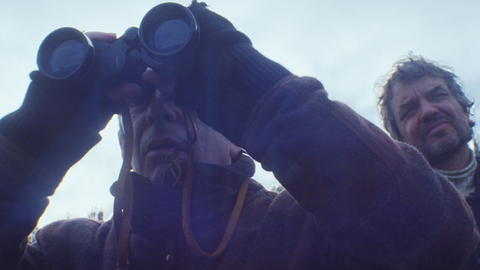Film of the Week: Victoria
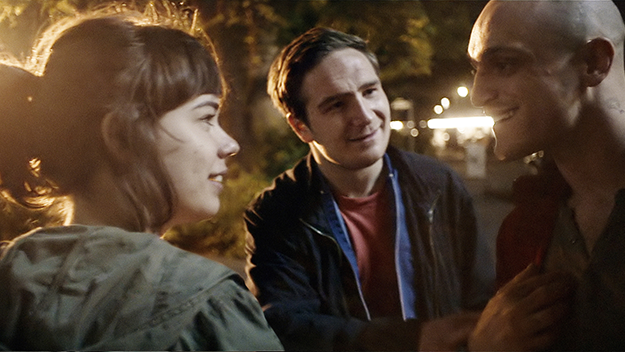
In the German film Victoria, a vast swathe of human experience has been squeezed into 134 minutes of narrative—dance-floor euphoria, flirtation, danger, a rooftop reverie, an impromptu piano recital, desperation, romance, the lot. And all in a single seamless extended shot. There’s a bank heist, too, although that’s not the most important part of the film. But still, Victoria had me feeling that every single-shot feature, not that there are too many of those, would benefit from a heist. Think how much more fun Sokurov’s Russian Ark would have been if that 19th-century crowd making their final stately exit from the Hermitage Museum had been smuggling out Titians under their crinolines and tailcoats.
As befits a tale of Berlin nightlife, Sebastian Schipper’s drama contains its share of drugs—but really, the film is a drug in its own right, exhilarating, but also producing a wider range of effects than just adrenaline buzz. From the very start, you get caught up in its rush—and being caught up is just what the film is about. Victoria (Laia Costa) is a young Spanish woman working in Berlin who falls in with some suspicious characters on her way out of a nightclub; this is the proverbial story of falling into dubious company and getting in way too deep. The film starts with strobing lights and the relentless thump of throbbing techno, as Victoria dances herself dizzy at a club at somewhere around 4 a.m. She moves off the dance floor and into the bar, then to a space near the front door, where some guy who can’t afford the cover fee leans in and asks her whether the place is any good. At first, he seems to be just another part of the crowded scenery of this already hectic film—but by the time Victoria leaves the place and heads out into the quiet street, he’s become a key character, and the thread that’s going to lead her on a very strange journey.
I’m usually averse to the clichéd use of the word “journey” to describe the trajectory of a film—but in Victoria, it seems unavoidable. That’s partly because Victoria, and the narrative, and our feelings all go through so many switchback turns that we really feel we’re being shunted from one position to another throughout. But Victoria is also literally a journey from location to location (22 of them, reputedly) with DP Sturla Brandth Grøvlen’s restless DV camera accompanying the characters all the way—sometimes at a distance, sometimes up close—as they walk, run, ride, drive, climb, dance, or take elevators through Berlin’s Mitte district.
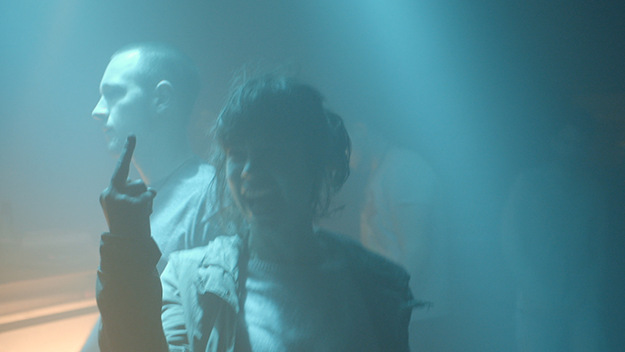
Leaving the club, Victoria is accosted by the guy who couldn’t get in, Sonne (Frederick Lau), a stocky, goofy-looking, wide-browed youngish guy who could be either a real softie or a real bruiser, it’s hard to know. He’s certainly, at this point, an awkwardly importunate bore, but, by the end of the film, we’ll believe in him as a genuinely romantic Brando-ish figure, and that counts as a journey, surely. He’s accompanied by three friends: dippy, out-of it Fuss (Max Mauff); Blinker, a swaggering long-haired corsair (Burak Yigit); and grimacing skinhead Boxer (Franz Rogowski), whose presence alone signals that the quartet is bad news. They are “real Berlin guys,” they insist, telling Victoria: “We can show you the real Berlin.” She’s insouciant, or naïve, or plain reckless enough to go along with them—so at what point do we realize that she might be up for anything the night may bring?
There’s a moment on a rooftop when we think that Victoria might be in danger—until Sonne gets nervy and solicitous when she stands too near the edge. At last, she goes to the cafe where she’s due to start serving in an hour or so, and astonishes Sonne (and us) by giving a dazzling piano recital of a passage from Liszt’s “Mephisto Waltz.” It looks as if the night is about to end on a note of intimate romance—and by this point, many viewers will have lost their sense of time and be uncertain whether we’re one or two hours into the film. But the night is young, there’s pressing business to attend to, and Victoria is going to be part of it.
This is where—after what you might consider to be an audaciously protracted build-up—the story proper begins. For some viewers, of course, the action intrigue that follows will feel like a jarring add-on to the loose, intimate realist ramble that we’ve had up till now. Everyone will have their own ideas of what constitutes the true “heart” of the action in Victoria, but I’d argue that the film’s substance is the unpredictable succession of discontinuous and wildly diverse moments, sewn together into what seems a continuous flow—which is how we think of life, surely. The thriller part of it begins with Victoria and her new chums driving to an underground car park to rendezvous with leathery-faced gangster Andi (Andre Hennicke, a sometime Christian Petzold player). He wants them to rob a bank, and insists on a run-through there and then, which they execute pretty clumsily; it’s odd to think that, for this scene in a film which must have been rehearsed with punctilious timing, the actors must have had to practice being convincingly inept and badly timed.
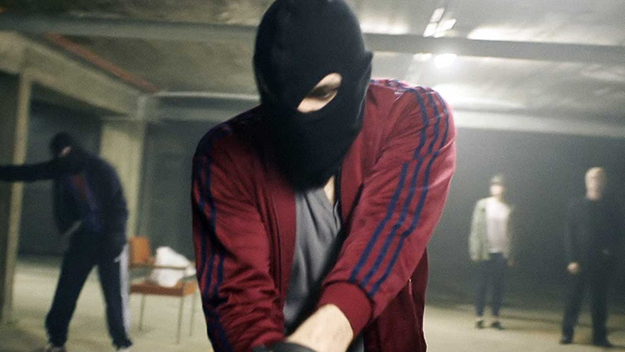
We later reach a moment at which, again, we’re ready to believe that the film is about to end. Victoria and the guys return to the nightclub for a triumphal rave, having taken the city and its pleasures for all they’re worth. If Victoria had ended here, in a neat circular manner, it would still have been pretty good, but ultimately just an extravagantly executed great-night-out story. But Schipper still has some surprising places left to go, and some unsuspected aspects of Victoria to show us. The reason the film is titled Victoria and not, say, Berlin by Night or Gone in 134 Minutes is that its heroine proves to be the most surprising thing about it, herself going through changes that we could barely imagine at the start, when she seems merely a credulous featherweight. Laia Costa—facially resembling a midway point between Björk and Elodie Bouchez—takes the character from childlike alertness, through various shades of vulnerability, anxiety and stress, to a truly feral intensity by the end.
To keep the team pumped up for their job, Andi gives them a mixture of Tilidin and cocaine. There’s surely an intimate affinity between hyper-extended shots and narcotic sensory distortion (as witness Gaspar Noé’s Into the Void). Victoria does indeed simulate a chemically altered experience of time, but not in a trippy way—it’s more to do with that hard-to-define state of consciousness that actors in particular seem to have in mind when they talk about “being in the moment.” Victoria is an absolute “in-the-moment” movie because it depicts an experience lived entirely in a continuous present tense. Victoria seemingly never knows what’s going to happen next, how she’s got where she is, how long she’s been there, or what the connections are between all these individual moments: it’s always right now. And that was presumably the experience of the film’s cast and crew, who would have needed to be in a state of energetic hyper-alertness all the way through a tightly calibrated and rehearsed shoot—especially since the actors were improvising their dialogue within the parameters of a set narrative.
Let’s clarify exactly what sort of long-take movie we’re dealing with. There’s none of the state-of-the-art illusionism of Gravity or of the trick-laden Birdman, with its invisible splices giving the impression of continuous action. I looked in vain for any moments when Schipper might have sneaked in an invisible cut; reportedly, Victoria genuinely was filmed in one continuous shot (to be exact, the third of three takes). The action takes place in real time, somewhere between 4 and 7 in the morning, which was exactly when it was shot. Victoria doesn’t involve the elastic manipulation of time seen in Birdman, in which the action spanned several days, squeezed into what looked like a single unbroken flow in which, nevertheless, discontinuities were knowingly highlighted to comic effect. Nor does Victoria play brazenly ingenious tricks of synchronization, as Birdman does (e.g. the theater light crashing down on an actor’s head at precisely the right moment). Schipper’s film is a much looser affair, and the most delicate timing problem involved appears to be the basic one of getting the action to the right length, so that Victoria comes in not too much over two hours, but also doesn’t happen so quickly that it’s still night when the action ends.
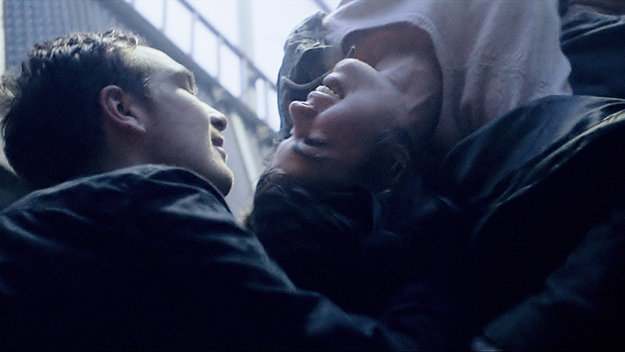
Even so, Victoria does play somewhat fast and loose in its play with time—because realistically, it’s unimaginable that Victoria’s roller-coaster night should be quite so frenzied, but nevertheless accommodate a few leisurely oases of calm and intimacy. Who in the world has ever spent such a whirlwind of a night—from dance floor to danger to operatically intense showdown with destiny, in just over two hours? While the action is real time, Victoria nonetheless involves a bravura feat of dramatic compression.
What you get from Victoria is something that for, all its spuriously immersive urgency, a 3-D attraction such as Robert Zemeckis’s The Walk manifestly isn’t able to provide—the sense of an actual performance happening while you watch. The more cinema depends on the detachment of artifice and manifest illusion, the more we yearn to see cinema that gives us something of the intensity of live event, a sense of the heightened present—and this is something that Victoria provides both in its acting and in its technical execution. To be fair, we get it from Birdman too, no matter how suspicious we may feel of its bullish Cirque du Soleil–style expertise.
Certainly, there can be an exhibitionistic, championship plate-spinning aspect to the art of the intricate long take, and there’s something of this in Victoria too. What stops the film from being alienating is partly its unpredictability, for Schipper and co-writers Olivia Neergaard-Holm and Eike Frederik Schulz refuse to give us too many signals to indicate the path ahead. You start off thinking, “Just where are we going with this?”—but before too long, you’ve stopped asking that, and instead abandoned yourself to the way the film cuts us off from familiar orderly daytime forms of logic. It’s the ultimate tribute to Victoria to say that, even if you watch it at night, you’ll emerge from the cinema feeling ready for a hearty breakfast.



